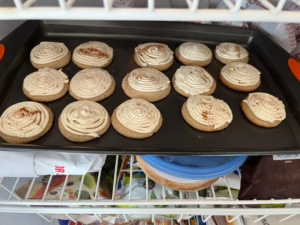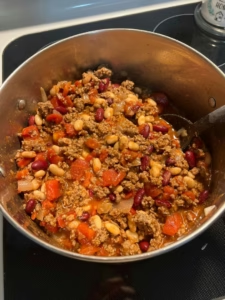Find out what cheese melts the best for cheese sauce in our guide. Explore top cheeses, their melting points, flavors, and secrets to a creamy consistency.
Table of contents
- What Makes a Good Cheese for Cheese Sauce?
- Which Cheeses are Best for Cheese Sauce?
- Can I Use Different Cheeses for Cheese Sauce?
- How to Make Cheese Sauce at Home: A Step-by-Step Guide
- The Secret Ingredient for Perfectly Melted Cheese Sauce: Sodium Citrate
- What Can I Serve with Cheese Sauce?
- How to Store and Reheat Cheese Sauce?
- FAQs About Cheese Sauce
What Makes a Good Cheese for Cheese Sauce?
Cheese sauce is a staple in many households, used to top a variety of dishes such as nachos, pasta, and vegetables. However, not all cheeses are created equal when it comes to making the perfect cheese sauce. Here are some characteristics that make a good cheese for cheese sauce:
- Melting Point: Cheeses that melt well, such as cheddar or gouda, are ideal because they create a smooth and creamy consistency when heated. Cheeses that don’t melt well, such as fresh mozzarella or feta, may result in a grainy or lumpy sauce. Learn more about the science behind cheese melting points.
- Flavor: The flavor of the cheese is also important when making cheese sauce. Mild cheeses, such as Monterey Jack or Colby, are great for those who prefer a subtle cheese flavor. On the other hand, stronger cheeses, such as blue cheese or Parmesan, can add a bold and tangy flavor to the sauce.
- Texture: Another factor to consider is the texture of the cheese. Cheeses that are crumbly or hard, such as Parmesan or feta, may not melt as well as softer cheeses like brie or fontina. Additionally, cheeses that are too soft, such as cream cheese, may result in a runny sauce.
For those looking to create a classic cheese sauce at home, explore our Homemade Cheese Sauce recipe for step-by-step guidance.
Which Cheeses are Best for Cheese Sauce?
Now that we understand what makes a good cheese for cheese sauce, let’s delve into the top cheeses that are best for making cheese sauce:
| Cheese Type | Description | Best Used In |
|---|---|---|
| Cheddar | Cheddar is a popular choice for cheese sauce because it melts well and has a sharp, tangy flavor. | Mac and cheese, nachos |
| Gouda | Gouda is another cheese that melts well and has a mild, nutty flavor. | Cheese sauce for those who want a subtler cheese flavor |
| Parmesan | Parmesan, with its strong, nutty flavor, adds depth to cheese sauce and is a key ingredient in our Alfredo Sauce Recipe – Make It at Home. | Pasta dishes and other Italian-inspired recipes |
| Swiss | Swiss cheese has a mild, sweet flavor and a good melting point. | Cheese sauce for dishes with ham and other salty meats |
| Monterey Jack | Monterey Jack is a mild, creamy cheese that melts well and adds a nice texture to cheese sauce. | Cheese sauce for those who want a mild cheese flavor |
| Colby | Colby cheese is similar to cheddar but has a milder flavor and a softer texture. | Cheese sauce in dishes like nachos and burgers |
| Gruyere | Gruyere has a nutty, slightly sweet flavor and melts well. | Fondue and other Swiss-inspired dishes |
| Blue Cheese | Blue cheese has a strong, tangy flavor. | Cheese sauce for those who want a bold cheese flavor |
| Brie | Brie is a soft, creamy cheese that melts well and adds a nice richness to cheese sauce. | Cheese sauce for those who want a subtle cheese flavor |
| Fontina | Fontina is a semi-soft cheese with a nutty, buttery flavor that melts well. | Pasta dishes and other Italian-inspired recipes |
Alternative Cheeses for Cheese Sauce
If you’re looking to experiment with different cheeses for your cheese sauce, there are plenty of alternatives to the top ten cheeses we’ve already discussed. Here are some options to consider:
Cream Cheese:
Cream cheese can be used to make a rich and creamy cheese sauce. It pairs well with pasta dishes and can add a tangy flavor to the sauce.
Goat Cheese:
Goat cheese has a tangy and slightly sweet flavor that can add a nice depth of flavor to cheese sauce. It’s a great option for those who want a different flavor profile in their cheese sauce.
Feta Cheese:
Feta cheese has a salty, tangy flavor that can add a nice kick to cheese sauce. It pairs well with Mediterranean-inspired dishes.
Smoked Gouda:
Smoked gouda has a smoky flavor that can add a nice depth of flavor to cheese sauce. It’s a great option for those who want a bolder cheese flavor.
Provolone:
Provolone is a semi-hard cheese with a mild flavor that melts well and adds a nice creaminess to cheese sauce. It’s a great option for those who want a milder cheese flavor.
Ricotta:
Ricotta cheese has a mild, slightly sweet flavor that can add a nice creaminess to cheese sauce. It pairs well with pasta dishes and other Italian-inspired recipes.
Mozzarella:
Mozzarella cheese has a mild flavor and a great melting point, making it a good option for cheese sauce. It’s a popular choice for pizza and other Italian-inspired dishes. For those interested in experimenting with Italian-inspired recipes, our Homemade Four Cheese Ravioli offers a delightful combination of flavors.
Pepper Jack:
Pepper jack cheese has a spicy kick that can add a nice heat to cheese sauce. It pairs well with Mexican-inspired dishes.
American Cheese:
American cheese has a mild flavor and a great melting point, making it a popular choice for cheese sauce in dishes like mac and cheese and burgers.
Velveeta:
Velveeta is a processed cheese product that melts well and has a mild, creamy flavor. It’s a popular choice for making cheese sauce because of its smooth texture and easy melting.
By experimenting with different cheeses, you can create a cheese sauce with a unique flavor profile that complements your favorite dishes. Just be sure to keep in mind the characteristics of good cheese for cheese sauce, such as melting point, flavor, and texture.
How to Make Cheese Sauce at Home: A Step-by-Step Guide
Making cheese sauce at home is a simple process that requires just a few common ingredients and a little bit of time. Here, we’ll walk you through a basic recipe for a cheddar cheese sauce, which can be easily customized to suit your taste preferences.
Ingredients:
- 1 cup of sharp cheddar cheese, shredded
- 1 cup of heavy whipping cream
- ¼ cup of butter, cut into cubes
- 2 cloves of garlic, minced
- ½ teaspoon of sea salt
- ¼ teaspoon of ground black pepper
Instructions:
- Heat a medium-sized saucepan over medium-low heat. Once the pan is warm, add the butter and allow it to melt.
- Stir in the heavy whipping cream, salt, pepper, and minced garlic. Mix all the ingredients together until well combined.
- Gradually add the shredded sharp cheddar cheese, stirring constantly. It’s important to add the cheese in batches to prevent it from clumping together. This process should take a minute or two at most.
- Bring the cheese sauce to a simmer, then remove it from the heat. The sauce will continue to thicken as it cools.
Tips for Perfect Cheese Sauce:
- Shred your own cheese: Pre-packaged shredded cheese often contains starch, which can prevent it from melting smoothly. For the best results, buy a block of cheese and shred it yourself.
- Don’t let the sauce boil: Boiling the sauce can cause the butter to separate from the rest of the ingredients or the cream to burn, both of which can lead to a grainy sauce. To prevent this, keep the heat low and remove the sauce from the burner as soon as it reaches a simmer.
- Customize your cheese sauce: Feel free to experiment with different types of cheese to create a unique flavor profile. You can also add other ingredients, such as herbs, spices, or hot sauce, to give your cheese sauce a personal touch.
The Secret to Perfectly Melted Cheese Sauce: Sodium Citrate
While the above recipe will yield a delicious cheese sauce, there’s a secret ingredient that can take your sauce to the next level: sodium citrate. Sodium citrate is an emulsifying salt that keeps the fat contained within the cheese’s protein structure, preventing it from separating and turning grainy when heated. This is why American cheese, which contains sodium citrate, remains creamy even when other cheeses would separate. Discover more about sodium citrate in modernist cuisine.
To make your cheese sauce as smooth and creamy as possible, simply add sodium citrate to the recipe. According to Food & Wine, the best ratio is 1 cup of water to 1 teaspoon of sodium citrate. Once the sodium citrate is dissolved, add the cheese and continue with the recipe as usual. The result will be the creamiest cheese sauce you’ve ever tasted.
Serving Suggestions for Cheese Sauce
Cheese sauce is incredibly versatile and can be used in a variety of dishes. Here are a few serving suggestions to get you started:
- Over vegetables: Drizzle your cheese sauce over steamed broccoli, cauliflower, or Brussels sprouts for a delicious and nutritious side dish.
- With pasta: Toss your cheese sauce with cooked pasta for a quick and easy mac and cheese. For a classic Italian dish that showcases the beauty of cheese sauce, try our Fettuccine Alfredo Recipe, a timeless favorite.
- On nachos: Pour your cheese sauce over a plate of nachos for a decadent treat.
- In a sandwich: Spread your cheese sauce on a sandwich for a gourmet twist.
- With chicken: Serve your cheese sauce with pan-fried chicken tenderloins for a complete meal.
Storing and Reheating Cheese Sauce
Proper storage is crucial to maintaining the freshness and flavor of your homemade cheese sauce. Allow the sauce to cool to room temperature, then transfer it to an airtight container or a jar with a tight-fitting lid. The sauce can be stored in the refrigerator for up to 4-5 days.
To reheat your cheese sauce, place it in a skillet over low heat and stir until it’s heated through. If the sauce has thickened too much, you can add a little milk or heavy whipping cream to thin it out.
FAQ
The best cheese for cheese sauce depends on the dish you’re making and your personal taste preferences. Explore this comprehensive guide to homemade cheese sauce for more insights.
Good cheese for cheese sauce should have a good melting point, a flavor that complements the dish, and a texture that contributes to a smooth, creamy consistency.
Yes, there are plenty of alternative cheeses that can be used to make cheese sauce. Some options to consider include cream cheese, goat cheese, feta cheese, and smoked gouda.
To make a smooth and creamy cheese sauce, start with a roux of butter and flour, then slowly add milk and cheese. Stir continuously to prevent lumps and ensure a smooth consistency.
Yes, mixing different cheeses can add a nice depth of flavor to your cheese sauce. Just be sure to choose cheeses that melt well and complement each other in flavor.
Conclusion
In conclusion, the best cheese for cheese sauce depends on the dish you’re making and your personal taste preferences. Whether you prefer a mild, creamy cheese like Monterey Jack or a bold, tangy cheese like blue cheese, there’s a cheese out there that’s perfect for your cheese sauce. By understanding the characteristics of good cheese for cheese sauce and experimenting with different cheeses, you can create a delicious and creamy cheese sauce that complements a variety of dishes. Happy cooking!







